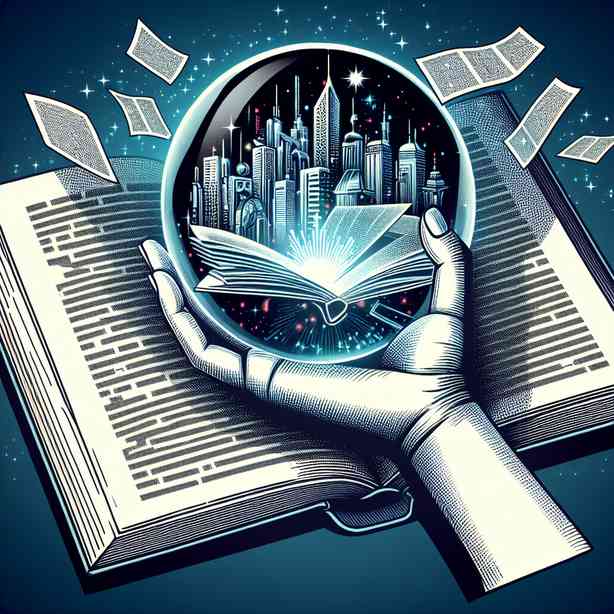
When Fiction Predicts Reality
Fiction has a remarkable ability to transcend time and space, transporting readers and audiences into worlds that mirror, challenge, and ultimately inform the reality we inhabit. The relationship between fiction and reality can be a fascinating exploration of human creativity, as well as a reflection of societal beliefs and fears. Throughout history, authors, filmmakers, and creators have often found themselves predicting future events or societal changes long before they come to fruition. This phenomenon raises questions about the nature of imagination, foresight, and the intricate link between art and life.
One notable example of fiction predicting reality can be found in science fiction literature. Classics such as George Orwell’s “1984” and Aldous Huxley’s “Brave New World” provide chilling insights into the potential future of society under oppressive regimes. Orwell’s depiction of surveillance and government control resonates profoundly in today’s world, where privacy concerns and digital monitoring have become prevalent within our daily lives. Huxley, on the other hand, warned of a society overly obsessed with pleasure and consumerism, themes that continue to play out in our modern context. These dystopian visions do not merely serve as warnings; they act as mirrors reflecting our own societal trends and behaviors, nudging us to reconsider our priorities as we navigate the complexities of modern life.
Furthermore, fiction serves as a sandbox for exploring technological advancements that may influence our future. The imagination of writers like Arthur C. Clarke, who envisioned satellites for communication decades before their invention, showcases how creative thinking can lead to real-world innovations. Clarke’s ideas laid the groundwork for technological progress in telecommunications. His imaginative concepts inspired scientists and engineers to make these dreams a reality, demonstrating the profound impact that fiction can have on technological evolution.
Equally compelling is the world of film, where directors and screenwriters craft narratives that often predate societal shifts. Movies such as “The Matrix” have explored themes of artificial intelligence and virtual realities, sparking discussions about the ethical implications of such technologies. As society increasingly grapples with the rise of AI and machine learning, the questions posed within these fictional narratives become ever more relevant and pressing. The ability of filmmakers to delve into speculative ideas influences public discourse, shaping our understanding of the implications of technological advancements.
Moreover, fictional narratives have the power to shape cultural perceptions and societal norms. For instance, the portrayal of diverse characters and narratives in literature and film plays a crucial role in advancing discussions about race, gender, and identity. Works like “The Handmaid’s Tale” by Margaret Atwood not only reflect societal anxieties about women’s rights and bodily autonomy but also inspire movements advocating for change in these very areas. Fiction has the unique capacity to not only mirror reality but also drive critical conversations that can lead to tangible societal transformations.
Equally important is the psychological aspect of how fiction feeds into our expectations of the future. The narratives we consume often create frameworks through which we interpret our real-life experiences. When we engage with stories—whether through books, films, or television—we are invited to consider possibilities that extend beyond our immediate realities. This engagement allows us to explore complex human emotions and scenarios, helping us navigate our perceptions of what is achievable or conceivable.
In addition, the role of speculative fiction in addressing environmental issues cannot be overstated. Authors like Octavia Butler have envisioned futures shaped by climate change and societal collapse, provoking readers to reflect on current ecological crises. By presenting possible futures—and the consequences of our present choices—these narratives serve as cautionary tales that can ignite activism and inspire collective action. The power of fiction to encapsulate complex issues, while empowering readers to envision alternatives, demonstrates a profound correlation between storytelling and social responsibility.
Moreover, the interconnectivity of fiction and reality in predictive storytelling extends beyond the realm of literature and film. Video games, for example, have emerged as a medium that marries narrative with interactive experiences. Games like “Detroit: Become Human” tackle themes of AI ethics and human autonomy, allowing players to engage with moral dilemmas in ways that resonate with ongoing debates in our world. This interactive nature of storytelling fosters a deeper understanding of complex themes and empowers individuals to confront their choices in a simulated environment.
As we delve deeper into the intricacies of how fiction predicts reality, one cannot overlook the role of cultural context. The societal norms and values of an era significantly influence the types of stories that emerge and the themes that resonate with audiences. For instance, post-war literature often grappled with trauma and identity, reflecting the existential struggles of those who lived through significant upheavals. Similarly, contemporary narratives that emphasize mental health and emotional resilience signal a cultural shift towards recognizing the complexities of the human experience.
In conclusion, the interplay between fiction and reality is a rich tapestry woven through history, culture, and human experience. The ability of writers, filmmakers, and creators to envision futures and societal shifts offers invaluable insights into our present condition. As we navigate uncharted territories—be it technological advancement, environmental challenges, or social justice movements—the voices of fiction remain potent and necessary. They not only inform our understanding of emerging realities but also inspire us to imagine, critique, and shape the future we collectively aspire to. Ultimately, it is in the exploration of these narratives that we find our most profound reflections on the world and ourselves, making storytelling an essential tool in both envisioning and constructing the reality we inhabit.


